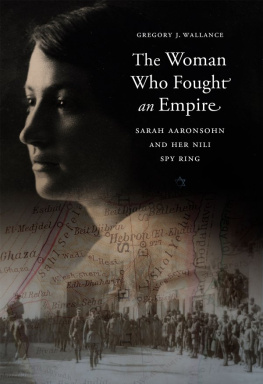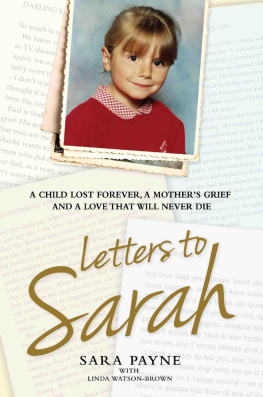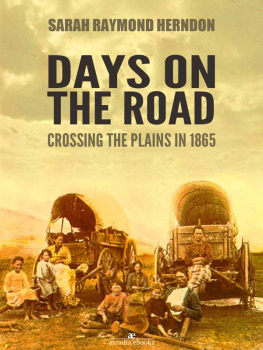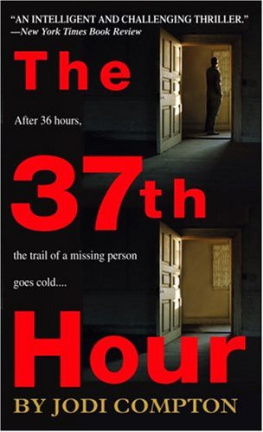Gregory J. Wallances beautifully written and meticulously researched account of Sarah Aaronsohns leadership of the Nili spy network during World War I casts a long overdue spotlight on one of the most fascinating personalities of the early Zionist era and should be required reading for anyone interested in modern Jewish history.
Ronald S. Lauder, president of the World Jewish Congress
A solid, well-researched biography of a remarkable woman.
The Woman Who Fought an Empire
Sarah Aaronsohn and Her Nili Spy Ring
Gregory J. Wallance
Potomac Books
An imprint of the University of Nebraska Press
2018 by Gregory J. Wallance
Cover designed by University of Nebraska Press; cover image is from the interior. Map iStockphoto.com/Pontuse.
All rights reserved. Potomac Books is an imprint of the University of Nebraska Press.
Library of Congress Cataloging-in-Publication Data
Names: Wallance, Gregory, author.
Title: The woman who fought an empire: Sarah Aaronsohn and her Nili spy ring / Gregory J. Wallance.
Description: Lincoln: Potomac Books, An imprint of the University of Nebraska Press, 2018. | Includes bibliographical references and index.
Identifiers: LCCN 2017034902 ISBN 9781612349435 (cloth: alk. paper)
ISBN 9781640120044 (epub)
ISBN 9781640120051 (mobi)
ISBN 9781640120068 (pdf)
Subjects: LCSH : Aaronsohn, Sarah. | SpiesPalestineBiography. | ZionistsPalestineBiography. | NILI (Organization: Palestine) | World War, 19141918Secret serviceGreat Britain. | Espionage, BritishPalestine.
Classification: LCC DS 125.3. A 864 W 35 2018 | DDC 940.4/8641092 [B]dc23
LC record available at https://lccn.loc.gov/2017034902
The publisher does not have any control over and does not assume any responsibility for author or third-party websites or their content.
In memory of my father, Don Wallance
Englishmen often talk about playing the game, but even during the war few Britishers played it to a finer finish than this Jewish girl.
Capt. L. B. Weldon of British Naval Intelligence,
Hard Lying: Eastern Mediterranean, 19141919
Contents
I am deeply grateful to the Beit Aaronsohn Nili Museum Archive in Zichron Yaakov, Israel. The Beit Aaronsohn staff provided me with copies of Sarah Aaronsohns letters and other archival materials, and unfailingly answered my questions and those of my interpreters. Given the volume of letters and materials in Hebrew, Russian, and French, I required the assistance of multiple interpreters and researchers. They included, in Israel, Ivgi Oanemos (both Hebrew and Russian), Jonathan Friedler and Research Assistant Yael Diamond of Diamond Services; in the United States, Cecilia Kleiman; and in Paris, Lisanna Wallance. In Kew, England, Bob OHara and Phil Tomaselli at Public Record Searches performed invaluable research in the National Archives. The staff of the Israel Defense Forces Archives assisted in locating an oral history that was helpful in constructing a narrative of key events, and the First Aliyah Museum in Zichron Yaakov provided helpful background and materials on the town and its early settlers. The National Library of Israel, the Khan Museum of Hadera, and the Central Zionist Archives in Jerusalem also provided assistance in locating archival materials. I am grateful to the persons with busy schedules who took time to answer questions or provide guidance, including Yuval Ben-Bassat, Uri Bar-Joseph, Ronald Florence, Kevin Morrow, and Yigal Sheffy. Michael Ben-Jacob helpfully provided guidance on the Midrash Rabba (a compilation of rabbinic homiletic literature). Yigal Sheffys British Military Intelligence in the Palestine Campaign, 19141918 and Ronald Florences Lawrence and Aaronsohn were also invaluable resources. Any questions of interpretation or emphasis, of course, are my responsibility. Much credit goes to the team at the University of Nebraska Press/Potomac Books, including Tom Swanson and Natalie ONeal, for their dedicated work in preparing the book for publication. I owe an enormous debt to my agents, Peter Bernstein and Amy Bernstein at the Bernstein Literary Agency. And the support and encouragement of my wife, Lies van Veen, as much as anything else, made this book possible.
I have adopted the usage of Middle East historians such as Eugene Rogan and Scott Anderson and frequently use Ottoman and Turkish interchangeably and Western spellings for cities, such as Beirut or Damascus. Even in English works, Jewish, Arab, and Turkish names can be spelled a variety of ways. For example, Sarahs settlement in Palestine has been spelled Zikron Yaaqov, Zichron Yaakov, Zichron Yaakov, and Zichron Yaacov. In general, I have attempted to use the version most commonly found in English-language works on the Middle East in World War I, but even then there is sometimes a close split, as with the case for Sarahs settlement. My somewhat arbitrary choice is Zichron Yaakov. In some instances, where a letters or memoirs usage conflicts with contemporary usage, such as Istanbul, I have used the citys name in the letter or memoirin this instance, Constantinople.
The Aaronsohn Family
Ephraim (father)
Malka (mother)
Aaron
Zvi
Samuel
Alexander
Sarah
Rivka
The Feinberg Family
Israel (father)
Fanya (mother)
Avshalom
Tzila
Shoshana
British Intelligence Officers in Egypt (1915 Rank)
Maj. Wyndham Deedes
Capt. Stewart Newcombe
Lt. Leonard Woolley
2nd Lt. Thomas E. Lawrence
Other British Figures
Gen. Sir Archibald Murray
Gen. Sir Edmund Allenby
Prime Minister David Lloyd George
First Lord of the Admiralty Winston Churchill
Sir Mark Sykes
The Rulers of the Ottoman Empire
Djemal Pasha
Enver Pasha
Talaat Pasha
The Nili Spies (Partial List)
Eitan Belkind
Naaman Belkind
Liebl Bernstein
Menashe Brunstein
Tova Gelberg
Yitzhak Halperin
Yosef Lishansky
Dr. Moshe Neumann
Nissan Rotman
Liova Schneersohn
Reuven Schwartz
American Figures
Henry Morgenthau, U.S. ambassador to the Ottoman Empire
World War I, one of the greatest disasters in human history, transformed the role of women in espionage. In prior conflicts, women spies had generally been amateurs who operated informally and on a small scale. By giving rise to the modern, centralized, and well-funded intelligence organization, the war created opportunities for women to spy as part of or even to run major spy networks.
Ironically enough, despite the many courageous women who skillfully spied in that war, the best known today is Mata Hari, the nude dancer and courtesan who had no significant espionage achievements but still found herself in front of a French firing squad in 1917. Mata Hari came to define the image of the female spy in the public imagination as an erotic espionage
Sarah Aaronsohn is the curative for the damaging Mata Hari stereotype of women spies. She was the intelligent, beautiful, brave, willful sister of an equally willful, world-famous scientist, and the skilled leader of a mostly male spy ring at a time when women held an inferior status in society. Her cloak-and-dagger exploits played an important role in the collapse of the Ottoman Empire and the outcome of World War I.
Sarah was born in 1890 in Palestine, then part of the Ottoman Empire, to Jewish emigrants from Romania. When World War I began in 1914, Sarah was married to a Jewish businessman in Constantinople (now Istanbul), the capital of the Ottoman Empire. Wartime postal restrictions and censorship limited Sarahs ability to get news from her family in the Zichron Yaakov settlement in Palestine, and she grew increasingly homesick. In late 1915 Sarah decided to return to Zichron for an extended visit. By a coincidence of timing and geography, Sarahs three-week trip took her through the heart of the genocide the Turks conducted against the Armenians.








